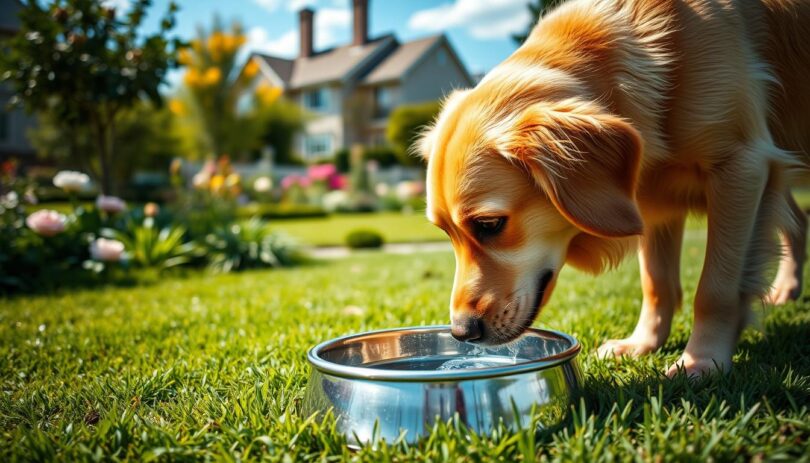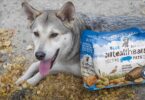Did you know 34% of pet owners admit to sharing human sports drinks with their furry companions during hot weather? While well-intentioned, this practice raises critical questions about animal nutrition and safety.
Electrolyte beverages like Gatorade® are formulated for human athletes, containing precise ratios of sugar, sodium, and artificial additives. These ingredients help replenish lost nutrients after intense physical activity—but four-legged friends have vastly different metabolic needs.
Veterinarians emphasize that canine hydration solutions should prioritize species-specific requirements. Small quantities of diluted sports drinks might temporarily help dehydrated pets under veterinary supervision. However, regular use could lead to health complications like obesity or electrolyte imbalances.
This article examines the science behind hydration products, identifies potential risks, and explores vet-approved alternatives. You’ll discover why water remains the gold standard and learn when specialized rehydration formulas become necessary.
Understanding these distinctions helps owners make informed decisions that align with their pet’s biological needs. Let’s analyze the facts to ensure your companion stays both safe and properly nourished.
Understanding Gatorade and Its Ingredients
What’s inside a bottle of Gatorade might surprise pet owners concerned about their companion’s health. While designed to replenish human athletes, these beverages contain elements that don’t align with animal nutritional needs.
Breaking Down the Formula
A typical Lemon Lime Gatorade contains water, sugar, dextrose, salt, citric acid, and artificial dyes. The drink delivers 34 grams of sugar and 270mg of sodium per 20-ounce serving. These components work together to restore energy and electrolytes lost during intense exercise—functions critical for humans but less relevant for most pets.
Why Human Hydration Mixes Differ
Sugars like dextrose provide quick energy bursts for active people, while sodium balances fluid retention. However, animals process these substances differently. High sugar intake may lead to weight gain or dental issues over time. Artificial additives, though safe for human consumption, can trigger allergic reactions or digestive upset in sensitive pets.
Water remains the primary ingredient, making up over 90% of the beverage. While hydration is essential, the added salts and sweeteners create a cocktail better suited to two-legged athletes. Veterinarians stress that specialized formulas exist for addressing canine dehydration without unnecessary risks.
can dogs drink gatorade Safely?
Pet hydration needs occasionally create situations where human-grade solutions might seem tempting. While water remains the ideal choice, there are limited scenarios where diluted sports drinks could serve as temporary aids.
Controlled Use Cases
Mild dehydration from short outdoor activities might warrant small electrolyte boosts. A teaspoon of unflavored Gatorade mixed with water could help after 30-minute fetch sessions in moderate temperatures. This applies only to healthy adult animals without pre-existing conditions.
Brief vomiting episodes or loose stools sometimes lead owners to consider rehydration options. Veterinarians may approve diluted solutions for 24-hour monitoring periods. Always use 1:4 ratios with water and discontinue if diarrhea persists beyond six hours.
Watch for adverse reactions like excessive thirst or lethargy. These signs indicate the mixture isn't suitable. Homemade chicken broth often works better for digestive issues without artificial additives.
Never replace veterinary care with sports drinks during serious health events. Severe dehydration requires IV fluids and professional assessment. Consult your clinic before offering any human-formulated products, even in emergencies.
Risks and Health Concerns for Dogs
Veterinary studies show that inappropriate electrolyte intake contributes to 12% of nutrition-related canine visits. Human sports drinks contain components that may disrupt biological processes in animals, creating risks far outweighing temporary hydration benefits.
Impact of High Sugar and Sodium Levels
Excessive sugar consumption promotes weight gain and strains pancreatic function. Just two tablespoons of sports drink could provide 25% of a medium-sized pet’s daily calorie needs. Over time, this elevates diabetes risks and accelerates tooth decay.
High sodium levels strain kidneys and may cause dangerous fluid imbalances. Symptoms like vomiting or tremors signal potential salt poisoning. Check gums regularly—dryness or discoloration often appears before severe complications develop.
Potential Effects of Artificial Additives
Dyes and preservatives in hydration formulas serve no nutritional purpose for animals. These chemicals might trigger stomach inflammation or allergic skin reactions. Loss of skin elasticity could indicate dehydration worsened by additives rather than resolved.
Chronic exposure to artificial ingredients correlates with digestive problems in sensitive breeds. Always consult a veterinarian before using human products—even minor formula changes help protect long-term wellness.
Alternative Hydration Options for Your Dog
Proper hydration solutions for pets prioritize safety and biological compatibility. While human sports drinks pose risks, these vet-approved choices support wellness without unnecessary additives.
Fresh Water and Homemade Solutions
Clean water remains the cornerstone of animal hydration. Refresh bowls twice daily and consider adding ice cubes during summer. For picky drinkers, try diluted low-sodium broth—simmer chicken breasts in unsalted water and strain before serving.
Freeze broth into ice pops for teething puppies or active companions. These homemade options provide moisture without artificial dyes. Always monitor intake and adjust portions based on activity levels.
Dog-Specific Electrolyte Supplements
Veterinary-formulated products like PetLyte offer balanced mineral blends. These powders mix with water to create species-appropriate rehydration solutions. Unlike human beverages, they contain minimal sugar and omit harmful preservatives.
High-quality kibble also contributes to fluid intake. Moisture-rich foods like canned pumpkin or watermelon (seedless) complement regular meals. Consult your vet about incorporating these into your companion’s diet for sustained hydration support.
Electrolytes and Their Role in Dog Hydration
Behind every energetic tail wag and playful leap lies a delicate balance of essential minerals in your dog's body. These charged particles, called electrolytes, regulate critical processes like nerve signaling and muscle contraction. Without proper levels, pets may experience fatigue, weakness, or even organ dysfunction.
Essential Minerals for Canine Health
Four key electrolytes work together to maintain hydration in dogs. Sodium and potassium manage fluid distribution between cells, while calcium supports bone strength and heart rhythm. Magnesium aids enzyme function and nutrient absorption. A 2023 veterinary study found balanced levels of these minerals improve recovery speed in dehydrated pets by 40% compared to water alone.
Potassium plays a particularly vital role in maintaining healthy kidneys and muscle tissue. This mineral helps convert food into energy and ensures proper oxygen flow through the bloodstream. Deficiencies can lead to irregular heartbeats, while excess amounts might cause muscle tremors.
Specialized canine electrolyte solutions provide precise mineral ratios that match biological needs. Unlike human sports drinks, these formulas contain minimal sugar and exclude artificial additives. Veterinarians recommend them for recovery after intense exercise, illness, or heat exposure to restore fluids safely.
Regular hydration checks help maintain electrolyte equilibrium. Lift your pet's skin gently—if it snaps back quickly, hydration levels are likely balanced. For persistent issues, consult your vet about species-specific supplements rather than reaching for human alternatives.
Recognizing and Preventing Dehydration in Dogs
Nearly 1 in 5 pets experience dehydration during peak summer months, yet many owners miss subtle warning signals. Early detection and proactive measures help maintain vital bodily functions and energy levels.
Common Signs Your Pet Isn’t Getting Enough Fluids
Watch for sunken eyes that appear dull or lack moisture. A dry nose with cracked texture often signals fluid deficiency. Gently pinch the scruff of the neck—if the skin doesn’t snap back quickly, this loss of elasticity confirms dehydration.
Other red flags include sticky gums and excessive panting. Lethargy during walks or disinterest in playtime may indicate worsening conditions. Check water bowls regularly—frequent refills suggest increased thirst demands.
Practical Tips to Maintain Hydration
Offer fresh water at least three times daily, using wide bowls to prevent whisker fatigue. Add ice cubes to encourage drinking during play sessions. For active companions, provide extra fluids before and after exercise.
Monitor outdoor activities on hot days—limit intense play to cooler morning hours. Carry collapsible bowls during walks for quick water breaks. Incorporate moisture-rich foods like cucumber slices into meals for added hydration support.
Routine checks ensure early intervention. Lift the neck skin weekly to test elasticity. Wipe the nose with a damp cloth if it feels overly dry. Contact your veterinarian immediately if symptoms persist beyond six hours.
When to Consult a Veterinarian for Your Dog’s Hydration Issues
Persistent symptoms like unrelenting vomiting or diarrhea signal urgent health issues requiring professional intervention. While mild dehydration often resolves with home care, certain warning signs demand immediate veterinary expertise to prevent life-threatening complications.
Symptoms That Warrant Professional Attention
Watch for dry gums lasting over six hours or sunken eyes that don’t improve with water intake. Rapid weight loss exceeding 5% body mass indicates severe fluid depletion. Lethargy preventing normal movement often accompanies dangerous electrolyte imbalances.
Veterinarians stress that repeated vomiting paired with diarrhea creates a dual threat. This combination accelerates fluid loss faster than pets can replenish it. Professionals assess capillary refill time and skin elasticity to determine IV fluid requirements—typically 10-15ml per pound hourly for critical cases.
Owners should contact their vet immediately if symptoms worsen despite initial care. Blood tests might reveal underlying illnesses complicating hydration issues. Early intervention reduces recovery time and prevents kidney strain from prolonged mineral deficiencies.
Never guess about rehydration amounts—veterinary teams calculate precise dosages based on weight and condition severity. Trust their expertise over internet remedies when your companion’s health hangs in the balance.
Keeping Your Dog Hydrated: Best Practices for a Healthy Pet
Maintaining proper hydration in pets requires understanding their unique biological needs and avoiding human-centric solutions. While sports drinks might temporarily address fluid loss, their high sugar content and artificial additives pose long-term health risks. Fresh water remains the safest choice, supplemented with vet-approved electrolyte formulas when necessary.
Follow these hydration strategies for optimal wellness:
• Provide 1 ounce of water per pound of body weight daily, adjusting for activity levels
• Use veterinary-recommended supplements instead of human beverages for electrolyte replenishment
• Monitor for signs like vomiting or diarrhea, which may indicate dehydration complications
Pair hydration efforts with nutrient-rich food to support overall health. Moisture-packed options like bone broth or watermelon slices complement regular meals. Check skin elasticity weekly by gently lifting the neck scruff—delayed retraction signals fluid imbalance.
For persistent issues like vomiting episodes, consult your veterinarian immediately. Prioritize preventive care through routine weight checks and access to clean water. By blending these practices, you’ll create a sustainable hydration routine that keeps your companion thriving.
FAQ
When might a vet recommend Gatorade for a dog?
A veterinarian may suggest diluted Gatorade in rare cases of severe dehydration caused by prolonged vomiting, diarrhea, or heatstroke. This should only occur under professional guidance, as standard hydration solutions for pets are safer.
How does high sodium content affect dogs?
Excessive sodium from sports drinks like Gatorade can lead to electrolyte imbalances, increased thirst, and kidney strain. Breeds prone to heart issues or older pets face higher risks of complications like hypertension.
Are artificial dyes in sports drinks harmful?
Additives like Blue 1 or Red 40 in some Gatorade flavors may trigger allergic reactions, digestive upset, or hyperactivity in sensitive pets. Opt for unflavored oral rehydration solutions without synthetic colors for safer hydration support.










Leave a Comment